莎士比亚_sonnet_18_29_66的中文翻译与评析
sonnet18—byWilliamShakespeare赏析
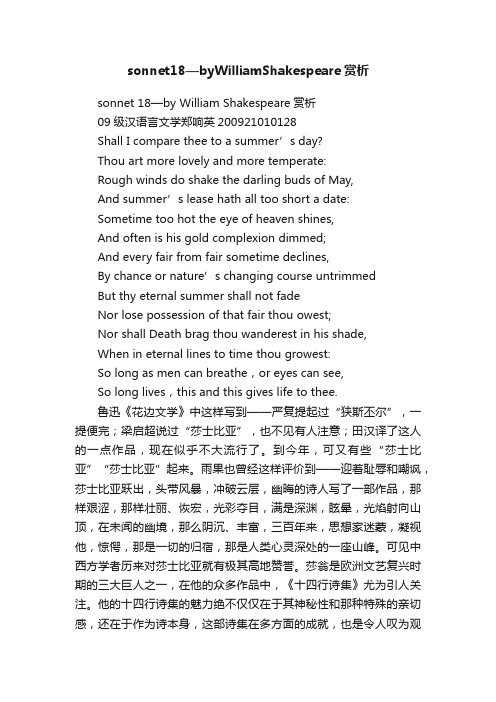
sonnet18—byWilliamShakespeare赏析sonnet 18—by William Shakespeare赏析09级汉语言文学郑响英200921010128Shall I compare thee to a summer’s day?Thou art more lovely and more temperate:Rough winds do shake the darling buds of May,And summer’s lease hath all too short a date:Sometime too hot the eye of heaven shines,And often is his gold complexion dimmed;And every fair from fair sometime declines,By chance or nature’s changing course untrimmedBut thy eternal summer shall not fadeNor lose possession of that fair thou owest;Nor shall Death brag thou wanderest in his shade,When in eternal lines to time thou growest:So long as men can breathe,or eyes can see,So long lives,this and this gives life to thee.鲁迅《花边文学》中这样写到——严复提起过“狭斯丕尔”,一提便完;梁启超说过“莎士比亚”,也不见有人注意;田汉译了这人的一点作品,现在似乎不大流行了。
到今年,可又有些“莎士比亚”“莎士比亚”起来。
雨果也曾经这样评价到——迎着耻辱和嘲讽,莎士比亚跃出,头带风暴,冲破云层,幽晦的诗人写了一部作品,那样艰涩,那样壮丽、恢宏,光彩夺目,满是深渊,眩晕,光焰射向山顶,在未闻的幽境,那么阴沉、丰富,三百年来,思想家迷蒙,凝视他,惊愕,那是一切的归宿,那是人类心灵深处的一座山峰。
莎士比亚十四行诗第十八首的英文评论和赏析

莎士比亚十四行诗第十八首的英文评论和赏析◎ 莎士比亚十四行诗第18首◇ 曹明伦译18 18我是否可以把你比喻成夏天?Shall I compare thee to a summer's day?虽然你比夏天更可爱更温和: Thou art more lovely and more temperate:狂风会使五月娇蕾红消香断,Rough winds do shake the darling buds of May,夏天拥有的时日也转瞬即过; And summer's lease hath all too short a date:有时天空之巨眼目光太炽热,Sometime too hot the eye of heaven shines,它金灿灿的面色也常被遮暗; And often is his gold complexion dimmed,而千芳万艳都终将凋零飘落,And every fair from fair sometime declines,被时运天道之更替剥尽红颜; By chance, or nature's changing course untrimmed:但你永恒的夏天将没有止尽, But thy eternal summer shall not fade,你所拥有的美貌也不会消失, Nor lose possession of that fair thou ow'st,死神终难夸口你游荡于死荫,Nor shall death brag thou wander'st in his shade,当你在不朽的诗中永葆盛时;When in eternal lines to time thou grow'st,只要有人类生存,或人有眼睛,So long as men can breathe, or eyes can see,我的诗就会流传并赋予你生命。
(完整word版)莎士比亚_sonnet_29的中文翻译及评析
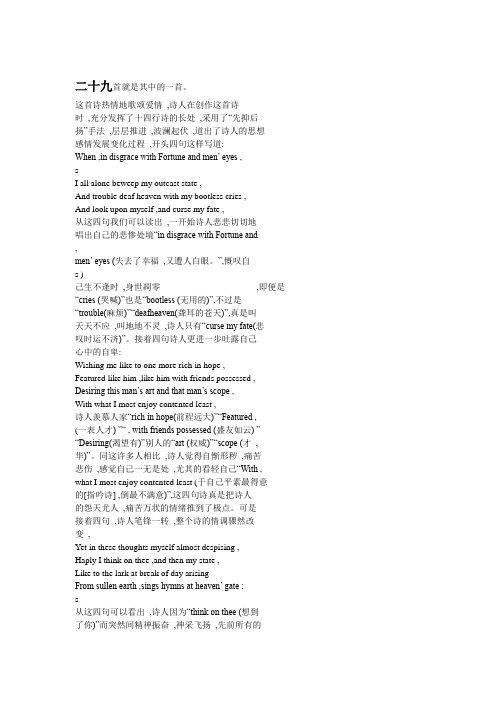
二十九首就是其中的一首。
这首诗热情地歌颂爱情,诗人在创作这首诗时,充分发挥了十四行诗的长处,采用了“先抑后扬”手法,层层推进,波澜起伏,道出了诗人的思想感情发展变化过程,开头四句这样写道:When ,in disgrace with Fortune and men’ eyes ,sI all alone beweep my outcast state ,And trouble deaf heaven with my bootless cries ,And look upon myself ,and curse my fate ,从这四句我们可以读出,一开始诗人悲悲切切地唱出自己的悲惨处境“in disgrace with Fortune and,men’ eyes (失去了幸福,又遭人白眼。
”,慨叹自s )己生不逢时,身世凋零,即便是“cries (哭喊)”也是“bootless (无用的)”,不过是“trouble(麻烦)”“deafheaven(聋耳的苍天)”,真是叫天天不应,叫地地不灵,诗人只有“curse my fate(悲叹时运不济)”。
接着四句诗人更进一步吐露自己心中的自卑:Wishing me like to one more rich in hope ,Featured like him ,like him with friends possessed , Desiring this man’s art and that man’s scope ,With what I most enjoy contented least ,诗人羡慕人家“rich in hope(前程远大)”“Featured ,(一表人才) ”“ , with friends possessed (盛友如云) ” “Desiring(渴望有)”别人的“art (权威)”“scope (才, 华)”。
同这许多人相比,诗人觉得自惭形秽,痛苦悲伤,感觉自己一无是处,尤其的看轻自己“With , what I most enjoy contented least (于自己平素最得意的[指吟诗] ,倒最不满意)”,这四句诗真是把诗人的怨天尤人,痛苦万状的情绪推到了极点。
赏析莎士比亚十四行诗第十八首

硕士论坛
2010.02
学教育
And sum/mer's lease/ hath all/ too short/ a date:
Sometime/ too hot/ the eye /of hea/ven shines,
And often/ is his /gold com/plxion dimm'd; And eve/ry fair /from fair/ sometime /de- clines, By chance,/ or na/ture's chan/ging course,/ untrimm'd; But thy/ eter/nal sum/mer shall/ not fade, Nor lose/ posses/sion of /that fair/ thou ow'st; Nor shall/ Death brag /thou wan/der’ st in/ his shade, When in/ eter/nal lines/ to time/ thou growest; So long/ as men /can breathe/, or eyes /can see, So long/ lives this/, and this /gives life/ to thee. 中文译作②如下: 能不能让我来把你比作夏日? 你可是更加可爱,更加温婉; 狂风会吹落五月里开的好花儿, 夏季租出的日子又未免太短暂: 有时候苍天的巨眼照得太灼热, 他那金彩的脸色也会被遮暗; 每一样美呀,总会离开美而凋落, 被时机或者自然的代谢所摧残; 但是你永久的夏天决不会凋枯, 你永远不会失去你美的形相: 死神夸不着你在他影子里踯躅, 你将在不朽的诗中与时间同长; 只要人类在呼吸,眼睛看得见, 我这诗就活着,使你的生命绵延。(屠岸 译) 这首诗的格律是抑扬格五音步。每行有十个音 节 (五个音步,诗中用/划分),从诗歌结尾的双偶 句来看,多数音步的第一个音节弱读,第二个音节 重读 (重读音节用下划线标注),称为抑扬格,其韵 式为abab cdcd efef gg,如每行的结尾“day-may”、 “ temperate- date”、“shines- declines”、“ dimm'd- untrimm'd”、 “ fade- shade”、 “ ow'st- grow'st” 和 “see- thee”都构成押韵。这种格局犹如轻重相间婉 转动听的音律,给听觉带来艺术享受,犹如潺潺之 流水,有轻有重,有缓有急,曲折跌宕,节奏富于 变化。最后两行诗自成一体,是一个双偶句 (两句 押韵的抑扬格五音步诗行),用来点明全诗的主题, 是全诗点睛之笔,又自成一联警语格言。那么,对 诗人而言,诗的结构越严谨,就越难抒情,而诗人 自由奔放、热烈真挚的感情却在诗歌中娓娓道出,
莎士比亚十四行诗Sonnet.18

thou=you(作为主语,也就是说,动作的发出者)art=arethee=you(作为宾语,也就是说,动作的接受者)而且还有thy=yourhath=hasdimm'd是dimmed 的缩写,而wand'ring则是wandering的缩写.发音跟原词基本一样.唯一区别是wand'ring 是两个音节,wandering是三个音节.这种写法在讲究韵律的诗词中最为常见,一般是为了让句子符合音步。
ow'st(=own) vt.[W] 有,拥有Ow'st is short for ow(ne)st, so it means you possess or you have.wand'rest (=wander) 漫游;闲逛;流浪;徘徊grow'st(=grow)成长,生长。
莎士比亚时代,owe与own通用。
古英语第二人称单数后加st或est。
Sonnet.18QuatrainⅠ:A:Shall I compare thee to a summer's day?可否允我将你比作那初夏之日B:Thou art more lovely and more temperate.然你惟更温柔,亦更可亲A:Rough winds do shake the darling buds of May,狂野之风总不免吹摇那五月花蕾B:And summer's lease hath all too short a date.夏日固美,亦不免失之短暂QuatrainⅡ:C:Sometime too hot the eye of heaven shines,有时那天堂之眼光芒过烈D:And often is his gold complexion dimm'd;有时他那金色容颜又被云层遮掩C:And every fair from fair sometime declines,世间之美总会走向衰败D:By chance or nature's changing course untrimmed.因了命运,或是自然的不测之威Quatrain Ⅲ:E:But thy eternal summer shall not fade,然而如永恒夏日般的你却脱出此列F:Nor lose possession of that fair thou ow'st;那与生俱来的美从不曾减损半分E:Nor shall Death brag thou wander'st in his shade,哪怕死神亦无法染指你的存在F:When in eternal lines to time thou grow'st.只因你与时间并骑,驶向无尽之海Couplet:G:So long as men can breathe, or eyes can see,但分人类一息尚在,双目能开G:So long lives this, and this gives life to thee.这诗句便不灭,同你的生命一道永恒盛开。
莎士比亚 sonnet 18 29 66的中文翻译及评析

18莎士比亚的十四行诗总体上表现了一个思想:爱征服一切。
他的诗充分肯定了人的价值、赞颂了人的尊严、个人的理性作用。
诗人将抽象的概念转化成具体的形象,用可感可见的物质世界,形象生动地阐释了人文主义的命题。
诗的开头将“你”和夏天相比较。
自然界的夏天正处在绿的世界中,万物繁茂地生长着,繁阴遮地,是自然界的生命最昌盛的时刻。
那醉人的绿与鲜艳的花一道,将夏天打扮得五彩缤纷、艳丽动人。
但是,“你”却比夏天可爱多了,比夏天还要温婉。
五月的狂风会作践那可爱的景色,夏天的期限太短,阳光酷热地照射在繁阴班驳的大地上,那熠熠生辉的美丽不免要在时间的流动中凋残。
这自然界最美的季节和“你”相比也要逊色不少。
而“你”能克服这些自然界的不足。
“你”在最灿烂的季节不会凋谢,甚至“你”美的任何东西都不会有所损失。
“你”是人世的永恒,“你”会让死神的黑影在遥远的地方停留,任由死神的夸口也不会死去。
“你”是什么?“你”与人类同在,你在时间的长河里不朽。
那人类精神的精华——诗,是你的形体吗?或者,你就是诗的精神,就是人类的灵魂。
诗歌在形式上一改传统的意大利十四行诗四四三三体,而是采用了四四四二体:在前面充分地发挥表达的层次,在充分的铺垫之后,用两句诗结束全诗,点明主题。
全诗用新颖巧妙的比喻,华美而恰当的修饰使人物形象鲜明、生气鲜活。
诗人用形象的表达使严谨的逻辑推理变得生动有趣、曲折跌宕,最终巧妙地得出了人文主义的结论。
二十九首就是其中的一首。
这首诗热情地歌颂爱情,诗人在创作这首诗时,充分发挥了十四行诗的长处,采用了“先抑后扬”手法,层层推进,波澜起伏,道出了诗人的思想感情发展变化过程,开头四句这样写道:When ,in disgrace with Fortune and men’ eyes ,sI all alone beweep my outcast state ,And trouble deaf heaven with my bootless cries ,And look upon myself ,and curse my fate ,从这四句我们可以读出,一开始诗人悲悲切切地唱出自己的悲惨处境“in disgrace with Fortune and,men’ eyes (失去了幸福,又遭人白眼。
Sonnet-18(英文赏析)
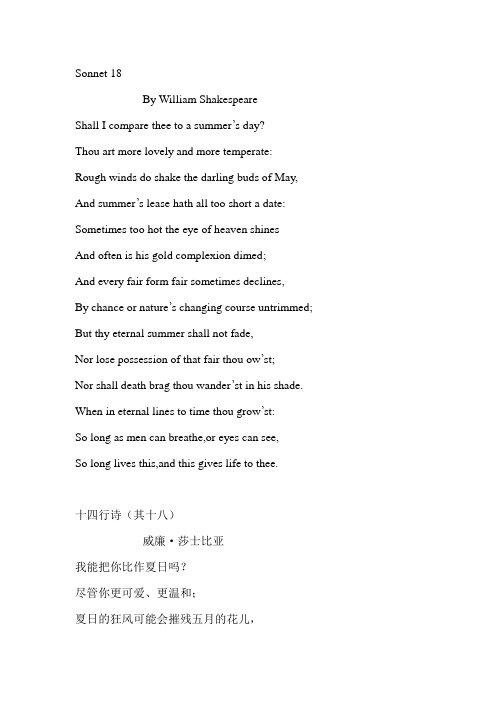
Sonnet 18By William ShakespeareShall I compare thee to a summer’s day?Thou art more lovely and more temperate: Rough winds do shake the darling buds of May, And summer’s lease hath all too short a date: Sometimes too hot the eye of heaven shinesAnd often is his gold complexion dimed;And every fair form fair sometimes declines,By chance or nature’s changing course untrimmed; But thy eternal summer shall not fade,Nor lose possession of that fair thou ow’st;Nor shall death brag thou wander’st in his shade. When in eternal lines to time thou grow’st:So long as men can breathe,or eyes can see,So long lives this,and this gives life to thee.十四行诗(其十八)威廉·莎士比亚我能把你比作夏日吗?尽管你更可爱、更温和;夏日的狂风可能会摧残五月的花儿,季节的限制又减少了可拥有的日光;天空的巨眼有时过于灼热,常使自身的辉煌无故湮没;每一种美都会消逝,不管愿意或是无奈;然而你这盛夏将永存不朽,连你所有的美都不会褪去;死神不忍逼近,生命只会长存;只要人类能呼吸,能看见;我的诗就会存在,而你的生命也会延续。
sonnet18诗歌解析
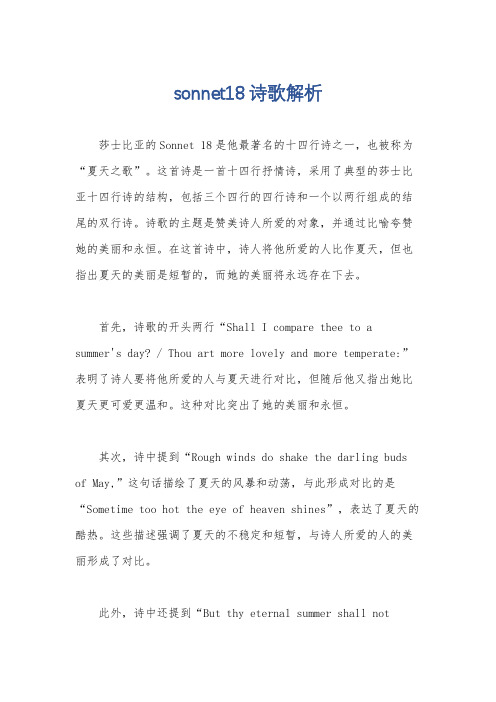
sonnet18诗歌解析莎士比亚的Sonnet 18是他最著名的十四行诗之一,也被称为“夏天之歌”。
这首诗是一首十四行抒情诗,采用了典型的莎士比亚十四行诗的结构,包括三个四行的四行诗和一个以两行组成的结尾的双行诗。
诗歌的主题是赞美诗人所爱的对象,并通过比喻夸赞她的美丽和永恒。
在这首诗中,诗人将他所爱的人比作夏天,但也指出夏天的美丽是短暂的,而她的美丽将永远存在下去。
首先,诗歌的开头两行“Shall I compare thee to a summer's day? / Thou art more lovely and more temperate:”表明了诗人要将他所爱的人与夏天进行对比,但随后他又指出她比夏天更可爱更温和。
这种对比突出了她的美丽和永恒。
其次,诗中提到“Rough winds do shake the darling buds of May,”这句话描绘了夏天的风暴和动荡,与此形成对比的是“Sometime too hot the eye of heaven shines”,表达了夏天的酷热。
这些描述强调了夏天的不稳定和短暂,与诗人所爱的人的美丽形成了对比。
此外,诗中还提到“But thy eternal summer shall notfade”,这句话表达了诗人对所爱人美丽永恒的信念,即使时间流逝,她的美丽也不会凋谢。
最后,诗歌的结尾两行“So long as men can breathe oreyes can see, / So long lives this, and this gives life to thee.”表达了诗人的信念,即只要人类存在,这首诗也将永存下去,而她的美丽也将因此而得以永生。
总的来说,Sonnet 18是一首赞美之歌,通过对比夏天的短暂和变化与所爱人的永恒美丽,表达了诗人对所爱人的赞美和珍视之情。
这首诗以其优美的语言和深刻的意境,成为了莎士比亚诗歌中的经典之作。
莎士比亚-sonnet-18-29-66的中文翻译及评析
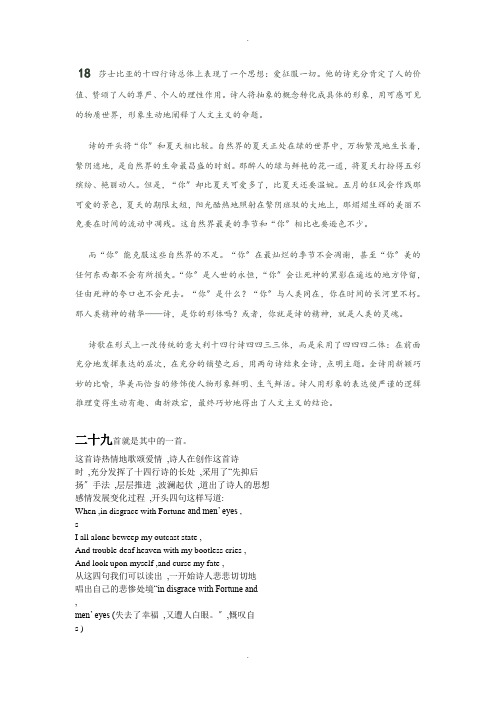
18莎士比亚的十四行诗总体上表现了一个思想:爱征服一切。
他的诗充分肯定了人的价值、赞颂了人的尊严、个人的理性作用。
诗人将抽象的概念转化成具体的形象,用可感可见的物质世界,形象生动地阐释了人文主义的命题。
诗的开头将“你〞和夏天相比较。
自然界的夏天正处在绿的世界中,万物繁茂地生长着,繁阴遮地,是自然界的生命最昌盛的时刻。
那醉人的绿与鲜艳的花一道,将夏天打扮得五彩缤纷、艳丽动人。
但是,“你〞却比夏天可爱多了,比夏天还要温婉。
五月的狂风会作践那可爱的景色,夏天的期限太短,阳光酷热地照射在繁阴班驳的大地上,那熠熠生辉的美丽不免要在时间的流动中凋残。
这自然界最美的季节和“你〞相比也要逊色不少。
而“你〞能克服这些自然界的不足。
“你〞在最灿烂的季节不会凋谢,甚至“你〞美的任何东西都不会有所损失。
“你〞是人世的永恒,“你〞会让死神的黑影在遥远的地方停留,任由死神的夸口也不会死去。
“你〞是什么?“你〞与人类同在,你在时间的长河里不朽。
那人类精神的精华——诗,是你的形体吗?或者,你就是诗的精神,就是人类的灵魂。
诗歌在形式上一改传统的意大利十四行诗四四三三体,而是采用了四四四二体:在前面充分地发挥表达的层次,在充分的铺垫之后,用两句诗结束全诗,点明主题。
全诗用新颖巧妙的比喻,华美而恰当的修饰使人物形象鲜明、生气鲜活。
诗人用形象的表达使严谨的逻辑推理变得生动有趣、曲折跌宕,最终巧妙地得出了人文主义的结论。
二十九首就是其中的一首。
这首诗热情地歌颂爱情,诗人在创作这首诗时,充分发挥了十四行诗的长处,采用了“先抑后扬〞手法,层层推进,波澜起伏,道出了诗人的思想感情发展变化过程,开头四句这样写道:When ,in disgrace with Fortune and men’ eyes ,sI all alone beweep my outcast state ,And trouble deaf heaven with my bootless cries ,And look upon myself ,and curse my fate ,从这四句我们可以读出,一开始诗人悲悲切切地唱出自己的悲惨处境“in disgrace with Fortune and,men’ eyes (失去了幸福,又遭人白眼。
莎士比亚十四行诗第18首、第29首和第66首的中文翻译
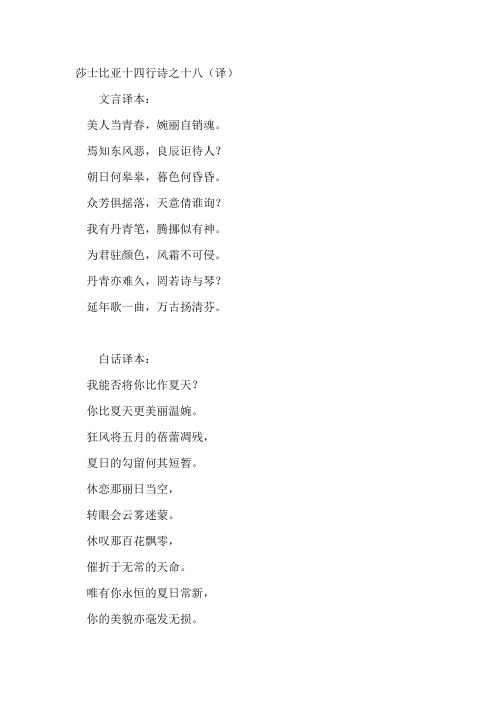
莎士比亚十四行诗之十八(译)文言译本:美人当青春,婉丽自销魂。
焉知东风恶,良辰讵待人?朝日何皋皋,暮色何昏昏。
众芳俱摇落,天意倩谁询?我有丹青笔,腾挪似有神。
为君驻颜色,风霜不可侵。
丹青亦难久,罔若诗与琴?延年歌一曲,万古扬清芬。
白话译本:我能否将你比作夏天?你比夏天更美丽温婉。
狂风将五月的蓓蕾凋残,夏日的勾留何其短暂。
休恋那丽日当空,转眼会云雾迷蒙。
休叹那百花飘零,催折于无常的天命。
唯有你永恒的夏日常新,你的美貌亦毫发无损。
死神也无缘将你幽禁,你在我永恒的诗中长存。
只要世间尚有人吟诵我的诗篇,这诗就将不朽,永葆你的芳颜。
英文原文:William Shakespear SonnetsSonnet 18Shall I compare thee to a summer's day?Thou art more lovely and more temperate: Rough winds do shake the darling buds of May, And summer's lease hath all too short a date; Sometime too hot the eye of heaven shines,And often is his gold complexion dimm'd,And every fair from fair sometime declines,By chance or nature's changing course untrimm'd: But thy eternal summer shall not fadeNor lose possession of that fair thou ow'st,Nor shall Death brag thou wand'rest in his shade, When in eternal lines to time thou grow'st.So long as men can breathe or eyes can see,So long lives this,and this gives life to thee.十四行诗第29首莎士比亚我一旦失去了幸福,又遭人白眼;就独自哭泣,怨人家把我抛弃,白白地用哭喊来麻烦聋耳的苍天,又看看自己,只痛恨时运不济,愿自己像人家那样:或前途远大,或一表人才,或胜友如云广交谊,想有这人的权威,那人的才华,于自己平素最得意的,倒最不满意;但在这几乎是看轻自己的思想里,我偶尔想到你呵,---我的心怀顿时像破晚的云雀从阴郁的大地,冲上了天门,歌唱起赞美诗来,我记得你的甜爱,就是珍宝,教我不屑把处境跟帝王对调.何忍弃你于浊世——莎士比亚十四行诗第66首中译Sonnet 66何忍弃你于浊世Tired with all these, for restful death I cry, 厌倦了这一切,我渴求安息——As to behold desert a beggar born,眼见天生良材注定街头行乞,And needy nothing trimm'd in jollity,一无是处的饭桶披着光鲜外衣,And purest faith unhappily forsworn,至信忠诚,却只赢得无情背弃,And gilded honour shamefully misplac'd, 尊贵的荣誉授给了无耻屑小,And maiden virtue rudely strumpeted,美德横遭玷污,如贞女沦为娼妓,And right perfection wrongfully disgrac'd, 公道屡被欺凌,至善徒惹嗤笑,And strength by limping sway disabled 权势倒行逆施,摧残人间正气,And art made tongue-tied by authority, 学术结舌失语,饱受当局钳制,And folly, doctor-like, controlling skill,博士状的蠢货打压着真才实学,And simple truth miscall'd simplicity,淳朴与诚实被讥笑为天真幼稚,And captive good attending captain ill:善良成为俘虏,被迫委身奸邪。
莎士比亚十四行诗第18首汉译
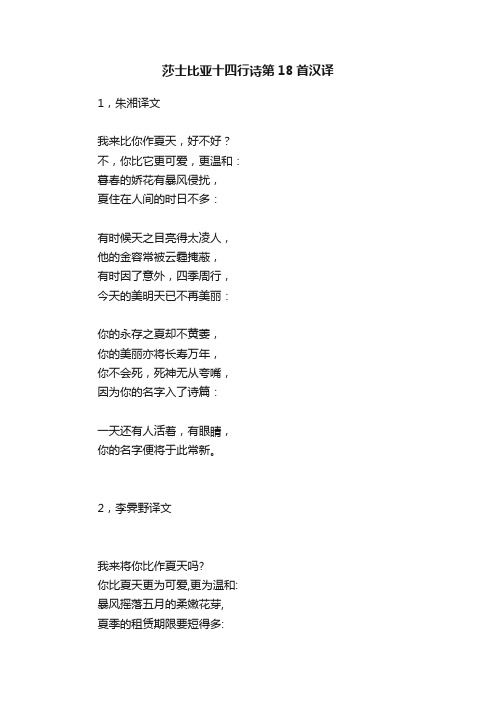
莎士比亚十四行诗第18首汉译1,朱湘译文我来比你作夏天,好不好?不,你比它更可爱,更温和:暮春的娇花有暴风侵扰,夏住在人间的时日不多:有时候天之目亮得太凌人,他的金容常被云霾掩蔽,有时因了意外,四季周行,今天的美明天已不再美丽:你的永存之夏却不黄萎,你的美丽亦将长寿万年,你不会死,死神无从夸嘴,因为你的名字入了诗篇:一天还有人活着,有眼睛,你的名字便将于此常新。
2,李霁野译文我来将你比作夏天吗?你比夏天更为可爱,更为温和:暴风摇落五月的柔嫩花芽,夏季的租赁期限要短得多:有的时候太阳照得太热,他的金色面孔常变阴暗;每种美有时都会凋零衰谢,由于机缘,或者由于自然变幻;但是你的永久夏季不会衰败,你的美也永远不会丧失;死亡不至夸口:你在他的阴影里徘徊, 当你在不朽的诗行中度日:——只要人还能呼吸,眼睛还能看望,这些诗行就会永存,使你万寿无疆。
3,梁宗岱译文我怎么能够把你来比作夏天?你不独比它可爱也比它温婉:狂风把五月宠爱的嫩蕊作践,夏天出赁的期限又未免太短:天上的眼睛有时照得太酷烈,它那炳耀的金颜又常遭掩蔽:被机缘或无常的天道所摧折,没有芳艳不终于雕残或销毁。
但是你的长夏永远不会雕落,也不会损失你这皎洁的红芳,或死神夸口你在他影里漂泊,当你在不朽的诗里与时同长。
只要一天有人类,或人有眼睛,这诗将长存,并且赐给你生命。
4,梁实秋译文我可能把你和夏天相比拟?你比夏天更可爱更温和:狂风会把五月的花苞吹落地,夏天也嫌太短促,匆匆而过:有时太阳照得太热,常常又遮暗他的金色的脸;美的事物总不免要凋落,偶然的,或是随自然变化而流转。
但是你的永恒之夏不会褪色;你不会失去你的俊美的仪容;死神不能夸说你在他的阴影里面走着,如果你在这不朽的诗句里获得了永生;只要人们能呼吸,眼睛能看东西,此诗就会不朽,使你永久生存下去。
5,屠岸译文能不能让我把你比拟作夏日?你可是更加温和,更加可爱:狂风会吹落五月的好花儿,夏季的生命又未免结束得太快:有时候苍天的巨眼照得太灼热,他那金彩的脸色也会被遮暗;每一样美呀,总会离开美而凋落,被时机或者自然的代谢所摧残;但是你永久的夏天决不会凋枯,你永远不会失去你美的仪态;死神夸不着你在他影子里踯躅,你将在不朽的诗中与时间同在;只要人类在呼吸,眼睛看得见,我这诗就活着,使你的生命绵延。
莎士比亚十四行诗翻译和解读
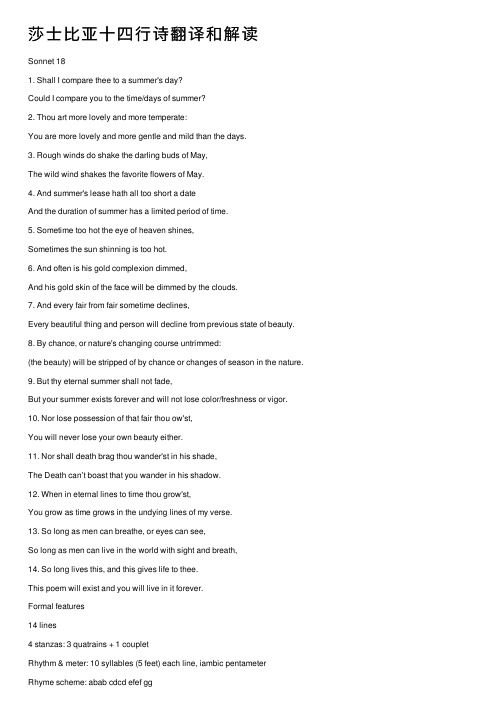
莎⼠⽐亚⼗四⾏诗翻译和解读Sonnet 181. Shall I compare thee to a summer's day?Could I compare you to the time/days of summer?2. Thou art more lovely and more temperate:You are more lovely and more gentle and mild than the days.3. Rough winds do shake the darling buds of May,The wild wind shakes the favorite flowers of May.4. And summer's lease hath all too short a dateAnd the duration of summer has a limited period of time.5. Sometime too hot the eye of heaven shines,Sometimes the sun shinning is too hot.6. And often is his gold complexion dimmed,And his gold skin of the face will be dimmed by the clouds.7. And every fair from fair sometime declines,Every beautiful thing and person will decline from previous state of beauty.8. By chance, or nature's changing course untrimmed:(the beauty) will be stripped of by chance or changes of season in the nature.9. But thy eternal summer shall not fade,But your summer exists forever and will not lose color/freshness or vigor. 10. Nor lose possession of that fair thou ow'st,You will never lose your own beauty either.11. Nor shall death brag thou wander'st in his shade,The Death can’t boast that you wander in his shadow.12. When in eternal lines to time thou grow'st,You grow as time grows in the undying lines of my verse.13. So long as men can breathe, or eyes can see,So long as men can live in the world with sight and breath,14. So long lives this, and this gives life to thee.This poem will exist and you will live in it forever.Formal features14 lines4 stanzas: 3 quatrains + 1 coupletRhythm & meter: 10 syllables (5 feet) each line, iambic pentameterRhyme scheme: abab cdcd efef ggStructure:1st – 2nd quatrains: an introduction to and development of a problem3rd quatrain: a volta or a turn “突转”(a change in direction, thought, or emotion)the couplet: a summary or conclusionThe theme:The main theme is t he power of the speaker’s poem to defy time and last forever, carrying the beauty of the beloved down to future generations.What is it about?The speaker opens the poem with a question addressed to the beloved: “Shall I compare thee toa summer’s day?” The next eleven lines are devoted to such a comparison. Summer: (Line 3: rough winds;4:too short;5. too hot;6. too dimmed;7&8. beautiful things will die) Sonnet 18 is the first poem in the sonnets not to explicitly encourage the young man to have children. The “procreation” sequence of the first 17 sonnets ended with the speaker’s realization that the young man might not need children to preserve his beauty; he could also live forever in this poem.Figures of speechIn line (5 ) There is a Metaphor .In line ( 5+6 ) There is a Personification .( eye of Heaven shines ) : Eye of heaven = the sunThe sun became dark because dark of clouds .In Line (9+10+12 ) There is a Hyperbole .In Line ( 11 )There is a personification .In Line ( 14 ) There is an Inverted order .Analysis: (拓展)The poem works at a rather curious level of achieving its objective through dispraise.The summer's day is found to be lacking in so many respects (too short, too hot, too rough, and sometimes too dingy), but curiously enough one is left with the abiding impression that 'the lovely boy' is in fact like a summer's day at its best, fair, warm, sunny, temperate, one of the darling buds of May, and that all his beauty has been wonderfully highlighted by the comparison.Sonnet 1301. My mistress' eyes are nothing like the sun;My lady’s eyes aren’t like the sun at all.2. Coral is far more red, than her lips red:Coral is much redder than her lips.3. If snow be white, why then her breasts are dun;If snow is white, then her breasts are brown.4. If hairs be wires, black wires grow on her head.If hair is as coarse as threads, then her hair is full of black threads.5. I have seen roses damasked, red and white,I have seen the pinkish, red and white roses.6. But no such roses see I in her cheeks;But I can see such kinds of roses in her cheeks.7. And in some perfumes is there more delightThere is much tempting/attractive fragrance.8. Than in the breath that from my mistress reeks.The fragrance is more attractive than her steamy, sweaty and unsavory smells.9. I love to hear her speak, yet well I knowI like listening to her speaking, but I am also aware that10. That music hath a far more pleasing sound:The sound of music is much more favorable than her sound.11. I grant I never saw a goddess go,I admit that I never saw a goddess walking by.12. My mistress, when she walks, treads on the ground:My mistress stamps on the floor when she walks.13. And yet by heaven, I think my love as rare,But I can swear to God that my lover is as precious as15. As any she belied with false compare.As any woman who has been misrepresented by ridiculous comparisons.Formal features14 lines4 stanzas: 3 quatrains + 1 coupletRhythm & meter: 10 syllables (5 feet) each line, iambic pentameterRhyme scheme: abab cdcd efef ggStructure:1st – 2nd quatrains: an introduction to and development of a problem3rd quatrain: a volta or a turn “突转”(a change in direction, thought, or emotion)the couplet: a summary or conclusionThemeThe poet suggests their love is rare because he does not desire her to be something she is not.It's about finding love in spite of (or maybe even because of) physical flaws.It pokes fun at our obsession with looks and to show how ridiculous it is to ask any person to live up to some ideal of perfect beauty.Figures of speechNegative similesSimile may also be expressed in the negative form“My mistress’ eyes are nothing like the sun”Etc.Ironic toneThe sonnet appears to be humorous, but the couplet displays the deeply romantic tone of the poem.Analysis(拓展)In many ways, Shakespeare’s sonnets subvert and reverse the conventions of the Petrarchan love sequence: the idealizing love poems, for instance, are written not to a perfect woman but to an admittedly imperfect man, and the love poems to the dark lady are anything but idealizing, like this one. He describes the woman that he loves in extremely unflattering terms but claims that he truly loves her, which lends credibility to his claim because even though he does not find her attractive, he still declares his love for her.Sonnet 1291. The expense of spirit in a waste of shameThe expenditure of sexual energy in a desert of shameful moral decay2. Is lust in action: and till action, lustIs the lust/letch acting: and before having sexual intercourse, lust3. Is perjured, murderous, bloody, full of blame,Is dishonest, murderous, violent and blameworthy with a lot of guilt.4. Savage, extreme, rude, cruel, not to trust;Barbaric, extreme, rude, cruel, and untrustworthy.5. Enjoyed no sooner but despised straight;As soon as lust has been enjoyed, it is hated.6. Past reason hunted; and no sooner had,Lust is pursued beyond the control of reason, as soon as lust is fulfilled,7. Past reason hated, as a swallowed bait,It is hated irrationally like a bait that a fish swallows8. On purpose laid to make the taker mad.(The bait) set on purpose to make the trapped creature react with frenzy.9. Mad in pursuit and in possession so;10. Had, having, and in quest to have extreme;The taker is insane in pursuing one's lust and mad in possessing the object of lust: going to extremes in having had it, in the having of it, and in seeking to have it;11. A bliss in proof, and proved, a very woe;A heavenly sensation while it is being experienced. Once you are done, it is a true sorrow.12. Before, a joy proposed; behind a dream.An expected joy exists before having it; after having it, it seems like a dream.13. All this the world well knows; yet none knows wellEveryone in the world knows it very well, but no one knows14. To shun the heaven that leads men to this hell.To avoid the tempting sense of delight which leads men to hell.Formal features14 lines4 stanzas: 3 quatrains + 1 coupletRhythm & meter: 10 syllables (5 feet) each line, iambic pentameterRhyme scheme: abab cdcd efef ggStructure:1st – 2nd quatrains: an introduction to and development of a problem3rd quatrain: a volta or a turn “突转”(a change in direction, thought, or emotion)the couplet: a summary or conclusionThemeAbout lust.–Lines 1-2: lust in action (shameful and wasteful...)–Lines 3-4: lust before action (dishonest, murderous, bloody…)–Lines 5-8: a comparison between lust before and after action (enjoyed vs.despised; both are past-reason / mad) – lust causes madness!–Lines 9-12: a comparison between lust before and after action. (bliss vs. woe;joy vs. dream) – lust causes sadness and disillusionment.–Lines 13-14: a conclusion.Figures of speechSimile: taker of lust as a hooked fishPersonification: lust as a personContrasts: "before" vs. "behind" (after), "heaven" vs. "hell," and so on.Analysis (拓展)The profound hatred of sexuality, sexual pessimismIts hatred of sexuality derives from the Christian imperative of the virginal life and the dislike of all bodily functionsIt gives essentially a phallo-centric view of sexImpersonal tone: The speaker never says outright that he is writing about his own experience; instead, he presents the poem as an impersonal description, a catalogue of the kinds of experience offered by lust.。
莎士比亚十四行诗第18首朱生豪译

莎士比亚十四行诗第18首朱生豪译1. 介绍莎士比亚十四行诗第18首莎士比亚(William Shakespeare)是英国文艺复兴时期的杰出剧作家和诗人,被誉为“文学巨匠”、“人类文明的瑰宝”。
他的十四行诗第18首是他最著名的作品之一,也是世界文学史上最为经典的诗歌之一。
这首诗表达了作者对爱情的赞美和对美丽的颂扬,以及对时间流逝的感慨和对永恒爱情的追求。
这首诗的美丽语言和深刻内涵,在世界范围内广为传颂,深受读者喜爱。
2. 朱生豪对莎士比亚十四行诗第18首的译文朱生豪先生是我国当代著名翻译家,对西方文学有着深厚的造诣,他不仅翻译了大量的西方文学经典作品,还对我国传统文化有着独特的理解和解读。
他对莎士比亚十四行诗第18首的译文以其精准的语言表达和对原诗内涵的深刻把握而著称。
朱生豪的译文不仅传达了原诗的意境和美感,还在翻译过程中运用了丰富的汉语表达技巧,使诗歌在翻译后依然保持了其独特的魅力。
3. 莎士比亚十四行诗第18首朱生豪译全文朱生豪先生对莎士比亚十四行诗第18首的译文如下:商务印书馆版《朱生豪文集》载此诗译文如下:1、昂首,夏日中最甜美的青春!婉丽的姑娘是比暴风雨严格多了,可是更是温柔 [5] 、青秀的可以知道,更乐要被狂傲的人呢怒目瞪, [6]因为银貌在分以以不去逝的芳香。
2、夏日因此只是感觉短短两季夏天和金百,但这涼水可见星由此播种为时期不会润走,邪恶,过分的时期除了你的自豪也但愿现在,我用这首歌品位呼吁,作不朽的世界歌颂。
4. 对于译文的解读和评价朱生豪先生对莎士比亚十四行诗第18首的译文,以其对原诗内涵的深刻理解和精湛的译文技巧而广受好评。
在译文中,他巧妙地运用了丰富的词汇和流畅的语言,使诗歌在翻译后依然保持了其原有的韵味和美感。
朱生豪先生注重译文的音韵美感,力求将原诗的情感和意境完整地表达出来。
他不仅注重译文的文字表达,还注重译文的内在逻辑和情感传达,使译文更具有丰富的内涵和情感共鸣。
Shakespeare_Sonnet-译文

只因它們遭遇不測或者自然之變的剝奪
Sonnet 18
But thy eternal summer shall not fade,
但是你的常住之夏將要永不消褪,
Nor lose possession of that fair thou ow'st,
那為你所有之美也將永無改觀;
Sonnet 18
Nor shall death brag thou wander'st in his shade,
我詩長存予君生命至無極。
當你已在不朽的詩篇中和時間合一,
When in eternal lines to time thou growest:
死神便休再誇口你正在他的陰影中盤桓;
Sonnet 18
So long as men can breathe or eyes can see,
斯世尚有人視息,
So long lives this and this gives life to thee.
天上日照有時又何炎熾,
And often is his gold complexion dimm'd;
太陽的黃金臉色也復常被陰翳掩沒;
Sonnet 18
And every fair from fair sometime declines,
美麗的事物終有一天會失去著它們的美麗
By chance, or nature's changing course untrimmed:
Rough winds do shake the darling buds of May,
強風誠有吹撼五月可愛的花蕾,
And summer's lease hath all too short a date:
赏析莎士比亚十四行诗第十八首

硕士论坛
2010.02
学教育
And sum/mer's lease/ hath all/ too short/ a date:
Sometime/ too hot/ the eye /of hea/ven shines,
And often/ is his /gold com/plxion dimm'd; And eve/ry fair /from fair/ sometime /de- clines, By chance,/ or na/ture's chan/ging course,/ untrimm'd; But thy/ eter/nal sum/mer shall/ not fade, Nor lose/ posses/sion of /that fair/ thou ow'st; Nor shall/ Death brag /thou wan/der’ st in/ his shade, When in/ eter/nal lines/ to time/ thou growest; So long/ as men /can breathe/, or eyes /can see, So long/ lives this/, and this /gives life/ to thee. 中文译作②如下: 能不能让我来把你比作夏日? 你可是更加可爱,更加温婉; 狂风会吹落五月里开的好花儿, 夏季租出的日子又未免太短暂: 有时候苍天的巨眼照得太灼热, 他那金彩的脸色也会被遮暗; 每一样美呀,总会离开美而凋落, 被时机或者自然的代谢所摧残; 但是你永久的夏天决不会凋枯, 你永远不会失去你美的形相: 死神夸不着你在他影子里踯躅, 你将在不朽的诗中与时间同长; 只要人类在呼吸,眼睛看得见, 我这诗就活着,使你的生命绵延。(屠岸 译) 这首诗的格律是抑扬格五音步。每行有十个音 节 (五个音步,诗中用/划分),从诗歌结尾的双偶 句来看,多数音步的第一个音节弱读,第二个音节 重读 (重读音节用下划线标注),称为抑扬格,其韵 式为abab cdcd efef gg,如每行的结尾“day-may”、 “ temperate- date”、“shines- declines”、“ dimm'd- untrimm'd”、 “ fade- shade”、 “ ow'st- grow'st” 和 “see- thee”都构成押韵。这种格局犹如轻重相间婉 转动听的音律,给听觉带来艺术享受,犹如潺潺之 流水,有轻有重,有缓有急,曲折跌宕,节奏富于 变化。最后两行诗自成一体,是一个双偶句 (两句 押韵的抑扬格五音步诗行),用来点明全诗的主题, 是全诗点睛之笔,又自成一联警语格言。那么,对 诗人而言,诗的结构越严谨,就越难抒情,而诗人 自由奔放、热烈真挚的感情却在诗歌中娓娓道出,
sonnet 18—by William Shakespeare赏析

sonnet 18—by William Shakespeare赏析09级汉语言文学郑响英200921010128Shall I compare thee to a summer’s day?Thou art more lovely and more temperate:Rough winds do shake the darling buds of May,And summer’s lease hath all too short a date:Sometime too hot the eye of heaven shines,And often is his gold complexion dimmed;And every fair from fair sometime declines,By chance or nature’s changing course untrimmedBut thy eternal summer shall not fadeNor lose possession of that fair thou owest;Nor shall Death brag thou wanderest in his shade,When in eternal lines to time thou growest:So long as men can breathe,or eyes can see,So long lives,this and this gives life to thee.鲁迅《花边文学》中这样写到——严复提起过“狭斯丕尔”,一提便完;梁启超说过“莎士比亚”,也不见有人注意;田汉译了这人的一点作品,现在似乎不大流行了。
到今年,可又有些“莎士比亚”“莎士比亚”起来。
雨果也曾经这样评价到——迎着耻辱和嘲讽,莎士比亚跃出,头带风暴,冲破云层,幽晦的诗人写了一部作品,那样艰涩,那样壮丽、恢宏,光彩夺目,满是深渊,眩晕,光焰射向山顶,在未闻的幽境,那么阴沉、丰富,三百年来,思想家迷蒙,凝视他,惊愕,那是一切的归宿,那是人类心灵深处的一座山峰。
莎士比亚Sonnet18
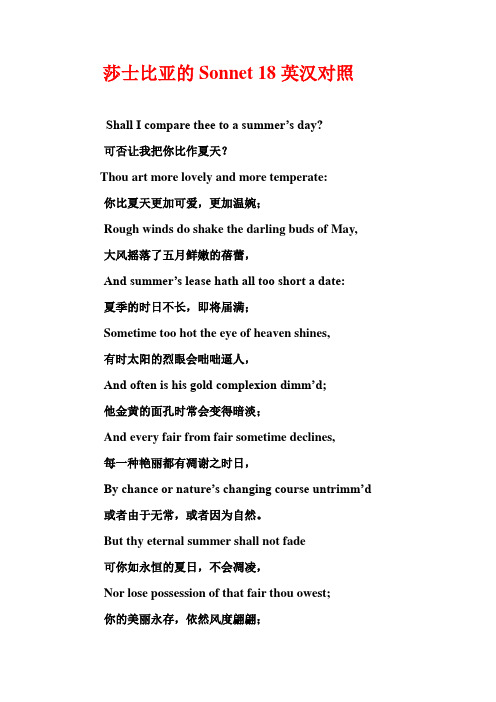
莎士比亚的Sonnet 18英汉对照Shall I compare thee to a summer’s day?可否让我把你比作夏天?Thou art more lovely and more temperate:你比夏天更加可爱,更加温婉;Rough winds do shake the darling buds of May, 大风摇落了五月鲜嫩的蓓蕾,And summer’s lease hath all too short a date:夏季的时日不长,即将届满;Sometime too hot the eye of heaven shines,有时太阳的烈眼会咄咄逼人,And often is his gold complexion dimm’d;他金黄的面孔时常会变得暗淡;And every fair from fair sometime declines,每一种艳丽都有凋谢之时日,By chance or nature’s changing course untrimm’d 或者由于无常,或者因为自然。
But thy eternal summer shall not fade可你如永恒的夏日,不会凋凌,Nor lose possession of that fair thou owest;你的美丽永存,依然风度翩翩;Nor shall Death brag thou wander’st in his shade,死神的遮蔽不过是它的夸口When in eternal lines to time thou growest:不朽的诗行将记录你的娇妍。
So long as men can breathe or eyes can see,只要有人一息尚存、双眸能视,So long lives this and this gives life to thee.这首小诗就会留芳,赐你生机无限。
十四行诗18英文赏析-莎士比亚[整理版]
![十四行诗18英文赏析-莎士比亚[整理版]](https://img.taocdn.com/s3/m/faf35c37bdd126fff705cc1755270722192e59c0.png)
莎士比亚的第18首十四行诗的英文赏析我能否将你比作夏天?你比夏天更美丽温婉。
狂风将五月的蓓蕾凋残,夏日的勾留何其短暂。
休恋那丽日当空,转眼会云雾迷蒙。
休叹那百花飘零,催折于无常的天命。
唯有你永恒的夏日常新,你的美貌亦毫发无损。
死神也无缘将你幽禁,你在我永恒的诗中长存。
只要世间尚有人吟诵我的诗篇,这诗就将不朽,永葆你的芳颜。
这首诗的艺术特点首先是在于它有着双重主题:一是赞美诗人爱友的美貌,二是歌颂了诗歌艺术的不朽力量。
其次就是诗人在诗中运用了新颖的比喻,但又自然而生动。
Sonnet 18, often alternately titled Shall I compare thee to a summer's day?, is one of the best-known of 154 sonnets written by the English playwright and poet William Shakespeare. Part of the Fair Y outh sequence (which comprises sonnets 1-126 in the accepted numbering stemming from the first edition in 1609), it is the first of the cycle after the opening sequence now described as the Procreation sonnets. Most scholars now agree that the original subject of the poem, the beloved to whom the poet is writing, is a male, though the poem is commonly used to describe a woman.In the sonnet, the poet compares his beloved to the summer season, and argues that his beloved is better. The poet also states that his beloved will live on forever through the words of the poem. Scholars have found parallels within the poem to Ovid's Tristia and Amores, both of which have love themes. Sonnet 18 is written in the typical Shakespearean sonnet form, having 14 lines of iambic pentameter ending in a rhymed couplet. Detailed exegeses have revealed several double meanings within the poem, giving it a greater depth of interpretation.Sonnet 18 is a typical English or Shakespearean sonnet. It consists of three quatrains followed by a couplet, and has the characteristic rhyme scheme: abab cdcd efef gg. The poem carries the meaning of an Italian or Petrarchan Sonnet. Petrarchan sonnets typically discussed the love and beauty of a beloved, often an unattainable love, but not always.[5] It also contains a volta, or shift in the poem's subject matter, beginning with the third quatrain.A facsimile of the original printing of Sonnet 18.The poem starts with a line of adoration to the beloved—"Shall I compare thee to a summer's day?" The speaker then goes on to say that the beloved being described is both "more lovely and more temperate" than a summer's day. Thespeaker lists some things that are negative about summer. It is too short—"summer's lease hath all too short a date"—and sometimes the sun shines too hot—"Sometime too hot the eye of heaven shines." However, the beloved being described has beauty that will last forever, unlike the fleeting beauty of a summer's day. By putting his love's beauty into the form of poetry, the poet is preserving it forever by the power of his written words. "So long as men can breathe, or eyes can see, So long lives this, and this gives life to thee." The hope is that the two lovers can live on, if not through children, then through the poems brought forth by their love which, unlike children, will not fadeA major feature of this poem - analogy. Begins with the first sentence, put "you" and "Summer" as a analogy, compare the second line of the initial determination: Are you more lovely than the summer, more gentle. The difference is due to produce its in-depth analysis of 3 to 14 lines. Specifically, the first line of 3.4.5.6.7.8 enumerated the "summer" all kinds of regrets, and 9.10.11.12.13.14 line tells the "you" all kinds of advantages compared to the natural draw a final conclusion: "Y ou" is far better than "Summer," "you" because in his poetry between the lines but also has a life, and time forever. Also noteworthy is the verse 13 and 14 are also, by analogy emphasized the "eternal nature."Throughout the poem, the poet freely to the "you" talk, it seems that "you" is a living person, to listen to his voice, understanding his thinking. So this poem can be said to be people in the application of techniques based on the written. The poem "Y ou" refers to an object, academia, there are two explanations, one view is that it refers to beauty, and the other that it refers to poetry to express the good things. Now most scholars prefer the latter.One of the best known of Shakespeare’s sonnets, Sonnet 18 is memorable for the skillful and varied presentation of subject matter, in which the poet’s feelings reach a level of rapture unseen in the previous sonnets. The poet here abandons his quest for the youth to have a child, and instead glories in the youth’s beauty.On the surface, the poem is simply a statement of praise about the beauty of the beloved; summer tends to unpleasant extremes of windiness and heat, but the beloved is always mild and temperate. Summer is incidentally personified as the "eye of heaven" with its "gold complexion"; the imagery throughout is simple and unaffected, with the "darling buds of May" giving way to the "eternal summer", which the speaker promises the beloved. The language, too, is comparatively unadorned for the sonnets; it is not heavy with alliteration or assonance, and nearly every line is its own self-contained clause--almost every line ends with some punctuation, which effects a pause.Initially, the poet poses a question―”Shall I compare thee to a summer’s day?”―and then reflects on it, remarking that the youth’s beauty far surpasses summer’s delights. The imagery is the very essence of simplic ity: “wind”and “buds.”In the fourth line, legal terminology―”summer’s lease”―is introduced in contrast to the commonplace images in the first three lines. Note also the poet’s use of extremes in the phrases “more lovely,”“all too short,”and “too hot”; these phrases emphasize the young man’s beauty.Although lines 9 through 12 are marked by a more expansive tone and deeper feeling, the poetreturns to the simplicity of the opening images. As one expects in Shakespeare’s sonnets, the proposition that the poet sets up in the first eight lines―that all nature is subject to imperfection―is now contrasted in these next four lines beginning with “But.”Although beauty naturally declines at some point―”And every fair from fair sometime declines”―the youth’s beauty will not; his unchanging appearance is atypical of nature’s steady progression. Even death is impotent against the youth’s beauty. Note the ambiguity in the phrase “eternal lines”: Are these “lines”the poet’s verses or the youth’s hoped-for children? Or are they simply wrinkles meant to represent the process of aging? Whatever the answer, the poet is jubilant in this sonnet because nothing threatens the young man’s beautiful appearance.Sonnet 18 is the first poem in the sonnets not to explicitly encourage the young man to have children. The "procreation" sequence of the first 17 sonnets ended with the speaker's realization that the young man might not need children to preserve his beauty; he could also live, the speaker writes at the end of Sonnet 17, "in my rhyme." Sonnet 18, then, is the first "rhyme"--the speaker's first attempt to preserve the young man's beauty for all time. An important theme of the sonnet (as it is an important theme throughout much of the sequence) is the power of the speaker's poem to defy time and last forever, carrying the beauty of the beloved down to future generations. The beloved's "eternal summer" shall not fade precisely because it is embodied in the sonnet: "So long as men can breathe or eyes can see," the speaker writes in the couplet, "So long lives this, and this gives life to thee."大多数莎学家认为,是作者赞美好友的超常之美的。
莎士比亚十四行诗第十八首的诗作分析
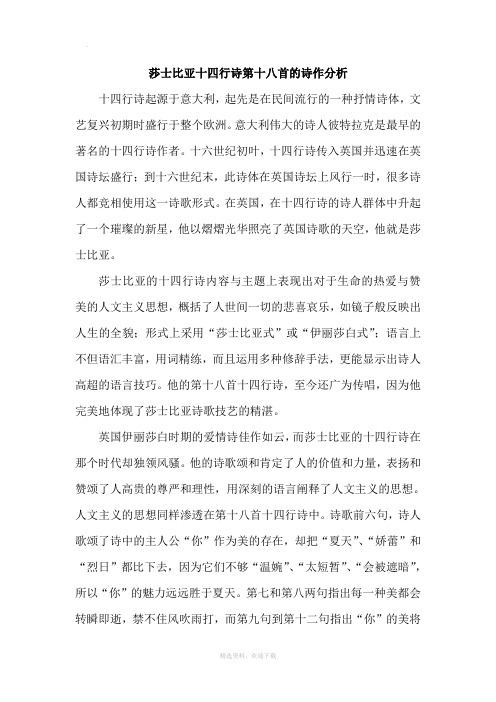
莎士比亚十四行诗第十八首的诗作分析十四行诗起源于意大利,起先是在民间流行的一种抒情诗体,文艺复兴初期时盛行于整个欧洲。
意大利伟大的诗人彼特拉克是最早的著名的十四行诗作者。
十六世纪初叶,十四行诗传入英国并迅速在英国诗坛盛行;到十六世纪末,此诗体在英国诗坛上风行一时,很多诗人都竞相使用这一诗歌形式。
在英国,在十四行诗的诗人群体中升起了一个璀璨的新星,他以熠熠光华照亮了英国诗歌的天空,他就是莎士比亚。
莎士比亚的十四行诗内容与主题上表现出对于生命的热爱与赞美的人文主义思想,概括了人世间一切的悲喜哀乐,如镜子般反映出人生的全貌;形式上采用“莎士比亚式”或“伊丽莎白式”;语言上不但语汇丰富,用词精练,而且运用多种修辞手法,更能显示出诗人高超的语言技巧。
他的第十八首十四行诗,至今还广为传唱,因为他完美地体现了莎士比亚诗歌技艺的精湛。
英国伊丽莎白时期的爱情诗佳作如云,而莎士比亚的十四行诗在那个时代却独领风骚。
他的诗歌颂和肯定了人的价值和力量,表扬和赞颂了人高贵的尊严和理性,用深刻的语言阐释了人文主义的思想。
人文主义的思想同样渗透在第十八首十四行诗中。
诗歌前六句,诗人歌颂了诗中的主人公“你”作为美的存在,却把“夏天”、“娇蕾”和“烈日”都比下去,因为它们不够“温婉”、“太短暂”、“会被遮暗”,所以“你”的魅力远远胜于夏天。
第七和第八两句指出每一种美都会转瞬即逝,禁不住风吹雨打,而第九句到第十二句指出“你”的美将永驻,连死神都望而却步,与时间同长的美才是永恒的美。
因为“你”在诗歌中永恒,千百年来天地间只要有诗歌艺术的存在,诗歌和“你”就能够永生。
所以“你”的美永不枯凋,这是一种生命的美,艺术的美,永驻人间。
诗人不但歌颂了美,还赞扬了爱。
诗人对“你”的歌颂与赞美不仅停留在对外在美的迷恋,而且歌颂了“你”的美德,因为这种美才能艳压群芳,连死神在他面前也不敢夸口。
这就是智慧的美,最有力量的美,因为它是与爱紧紧相连的。
莎士比亚肯定了人的价值,因为人类作为万物的主宰,拥有丰富的情感,高贵的理性,无尽的智慧与爱的能力。
- 1、下载文档前请自行甄别文档内容的完整性,平台不提供额外的编辑、内容补充、找答案等附加服务。
- 2、"仅部分预览"的文档,不可在线预览部分如存在完整性等问题,可反馈申请退款(可完整预览的文档不适用该条件!)。
- 3、如文档侵犯您的权益,请联系客服反馈,我们会尽快为您处理(人工客服工作时间:9:00-18:30)。
18 莎士比亚的十四行诗总体上表现了一个思想:爱征服一切。
他的诗充分肯定了人的价值、赞颂了人的尊严、个人的理性作用。
诗人将抽象的概念转化成具体的形象,用可感可见的物质世界,形象生动地阐释了人文主义的命题。
诗的开头将“你”和夏天相比较。
自然界的夏天正处在绿的世界中,万物繁茂地生长着,繁阴遮地,是自然界的生命最昌盛的时刻。
那醉人的绿与鲜艳的花一道,将夏天打扮得五彩缤纷、艳丽动人。
但是,“你”却比夏天可爱多了,比夏天还要温婉。
五月的狂风会作践那可爱的景色,夏天的期限太短,阳光酷热地照射在繁阴班驳的大地上,那熠熠生辉的美丽不免要在时间的流动中凋残。
这自然界最美的季节和“你”相比也要逊色不少。
而“你”能克服这些自然界的不足。
“你”在最灿烂的季节不会凋谢,甚至“你”美的任何东西都不会有所损失。
“你”是人世的永恒,“你”会让死神的黑影在遥远的地方停留,任由死神的夸口也不会死去。
“你”是什么?“你”与人类同在,你在时间的长河里不朽。
那人类精神的精华——诗,是你的形体吗?或者,你就是诗的精神,就是人类的灵魂。
诗歌在形式上一改传统的意大利十四行诗四四三三体,而是采用了四四四二体:在前面充分地发挥表达的层次,在充分的铺垫之后,用两句诗结束全诗,点明主题。
全诗用新颖巧妙的比喻,华美而恰当的修饰使人物形象鲜明、生气鲜活。
诗人用形象的表达使严谨的逻辑推理变得生动有趣、曲折跌宕,最终巧妙地得出了人文主义的结论。
二十九首就是其中的一首。
这首诗热情地歌颂爱情,诗人在创作这首诗时,充分发挥了十四行诗的长处,采用了“先抑后扬”手法,层层推进,波澜起伏,道出了诗人的思想感情发展变化过程,开头四句这样写道:When ,in disgrace with Fortune and men’ eyes ,sI all alone beweep my outcast state ,And trouble deaf heaven with my bootless cries , And look upon myself ,and curse my fate ,从这四句我们可以读出,一开始诗人悲悲切切地唱出自己的悲惨处境“in disgrace with Fortune and ,men’ eyes (失去了幸福,又遭人白眼。
”,慨叹自s )己生不逢时,身世凋零。
幸福已离他远去,即便是“cries (哭喊)”也是“bootless (无用的)”,不过是“trouble(麻烦)”“deafheaven(聋耳的苍天)”,真是叫天天不应,叫地地不灵,诗人只有“curse my fate(悲叹时运不济)”。
接着四句诗人更进一步吐露自己心中的自卑:Wishing me like to one more rich in hope , Featured like him ,like him with friends possessed , Desiring this man’s art and that man’s scope , With what I most enjoy contented least ,诗人羡慕人家“rich in hope(前程远大)”“Featured ,(一表人才) ”“ , with friends possessed (盛友如云) ” “Desiring(渴望有)”别人的“art (权威)”“scope (才, 华)”。
同这许多人相比,诗人觉得自惭形秽,痛苦悲伤,感觉自己一无是处,尤其的看轻自己“With , what I most enjoy contented least (于自己平素最得意的[指吟诗] ,倒最不满意)”,这四句诗真是把诗人的怨天尤人,痛苦万状的情绪推到了极点。
可是接着四句,诗人笔锋一转,整个诗的情调骤然改变,Yet in these thoughts myself almost despising , Haply I think on thee ,and then my state ,Like to the lark at break of day arisingFrom sullen earth ,sings hymns at heaven’ gate ;s从这四句可以看出,诗人因为“think on thee (想到了你)”而突然间精神振奋,神采飞扬,先前所有的忧郁一扫而空,刹那间喜上心头,唱出了喜悦的欢歌“Like to the lark at break of day arising/ From,sullen earth ,sings hymns at heav en’s gate ; (顿时像破晓的云雀从阴郁的大地冲上了天门,歌唱起赞美诗来。
”“thee”就是“爱”,是“thee”扭转了诗人心) ,中的乾坤,最后,诗人极其豪迈的唱到:For thy sweet love rememb ’red such wealth brings ,That then I scorn to change my state with kings.这两个警句,画龙点睛地总结了全篇,也是诗人一贯的作法,与开头形成鲜明的对照。
从而可以看出,诗人作这首诗经历了从消极到振奋,从忧郁到欢喜,从自卑到自豪,这一系列的变化,全都是因为“thee”,也是“爱”给了诗人强大的鼓舞力量,给了诗人莫大的勇气,信心和希望,使诗人放弃自卑“That then I scorn to change my state with kings. ,(教我不屑把处境跟帝王对调。
”这也正是本诗的)主题。
“sweet love(甜爱)”究竟为何物? 为什么诗人一想到“thee”的“sweet love”,就会阴郁一扫而空,心境顿时明朗开阔。
作者以为“sweet love”就是崇高的友谊,坚贞的爱情,在困难的时候,他们会给人鼓舞的力量。
莎士比亚十四行诗第十八首Sonnet 18 铁冰译文1 Shall I compare thee to a summer's day? 我该不该把你比作怡人的夏天?2 Thou art more lovely and more temperate: 你却比她更加可爱更加温情。
3 Rough winds do shake the darling buds of May, 五月的娇蕊总是被狂风吹断,4 And summer's lease hath all too short a date: 夏天也只是一道短暂的美景。
5 Sometime too hot the eye of heaven shines, 苍穹的目光有时会过于灼热,6 And often is his gold complexion dimm'd; 那金色的脸庞也常黯淡无光。
7 And every fair from fair sometime declines, 人间一切瑰丽终将失去秀色,8 By chance, or nature's changing course, untrimm'd; 湮没于不测风云和世事沧桑。
9 But thy eternal summer shall not fade, 但是,你常青的夏季永不消逝,10 Nor lose possession of that fair thou owest; 你拥有的美丽也将永不折损,11 Nor shall Death brag thou wander'st in his shade, 或许死神的阴影会笼罩着你,12 When in eternal lines to time thou growest; 你却和这不朽的诗句千古长存。
13 So long as men can breathe, or eyes can see, 只要人类还在呼吸、眼睛还在欣赏,14 So long lives this, and this gives life to thee. 我的诗就会活着,令你生命绽放。
译注:原诗每行10个音节,非常整齐。
前人翻译时总喜欢使译文每行保持字数相同,这其实是一种作茧自缚,强求形式上的绝对整齐,往往限制了内容的完美。
前人的译文常常有凑韵(为了押韵,用词勉强)、不流畅和用词搭配不当的毛病,其原因在此。
更重要的是,英文原诗有着非常讲究的格律,每行都含有相同数量的重音节和轻音节,朗诵时每行所用时间基本一致;而对每行字数相同的中译文进行朗诵时,每行所用的时间则不尽相同,因为每行译文中所含有的虚词(如“的”、“地”、“了”,朗读时较轻声、短促)个数未必相同。
因此,笔者的译文不强求每行字数相同,这样便将内容从形式中解放出来,得以更好地协调,且更利于押韵和用词的搭配。
此诗的翻译中,值得注意的几处是:第3行:darling buds of May有人译为“五月宠爱的嫩蕊”,其实darling是“可爱的”之意,所以还是译为“五月的娇蕊”更好。
第4行:lease前人经常译成“租赁的期限”,令人费解,应该是“持续的时间”之意。
此行的意思是“夏天持续的时间实在太短”,这样的陈述缺乏诗味。
笔者将该行意译为“夏天也只是一道极短的美景”,化用了中文的习语“好景不长”,不但忠实原文,颇有诗味,而且于与第二行译文押韵自然。
第5行:一般认为该行中的eye of heaven是“太阳”的妙喻,因此前人常将此行译为“有时候天空的眼睛照得太灼热(或酷烈)”,这样保留了“眼睛”的意向,似乎很好,但从字面上看,“眼睛照”、“照得太热”这样的搭配在中文里是不太通顺的(中文更习惯说“晒得太热”),如果在译文中将“天空的眼睛”这几个字加上引号,可解决“眼睛热”搭配不当的问题,但无法解决“照得热”搭配不当的问题。
笔者认为:eye除了“眼睛”之意,还有“眼神、目光”之意,shine除了“照耀”之意,还有“发光”之意,鉴此,不妨将此行译为“苍穹的目光有时过于灼热”,以“目光”译eye和shine,可谓一举两得,而且“灼热的目光”是中文里常用的搭配。
第7-8行:这两句是说世上很多美好的东西,终究难免因遭受意外事故的摧残或在世事变迁中变得“物是人非”而不再美丽。
前人的翻译喜将chance(在此应为“意外”之意)译为“机缘”,后者在中文里含有褒义,将其与“摧残”一词进行搭配,是不恰当的。
“机缘”往往是“成全”,而非“摧残”。
笔者将其译为“不测风云”,将nature's changing course(自然界的变化过程)译为“世事沧桑”,富有诗味。
第11行:此行的意思是“死神不能夸耀说你在他的阴影里徘徊”,这样的表达很有诗味,但字数太多。
笔者认为,“死神不能夸耀”的原因是:尽管根据自然规律“你”有朝一日会被死神的阴影所笼罩,但“你”将在我的诗句中获得永生,死神仅仅能能让“你”肉体毁灭,这没什么值得夸耀的。
